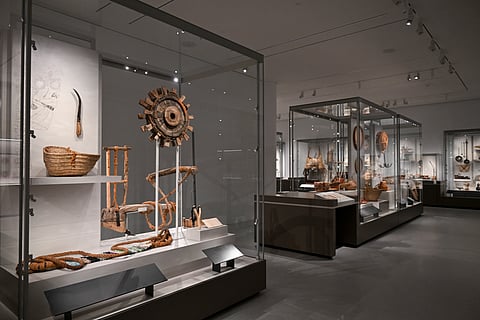Al Ain Museum: Sharing the past to inspire our future
How UAE’s museum renews national journey of preservation, participation, and progress

Al Ain Region is our living oasis. From ancient springs to a thriving city, its story of growth was driven by the ingenuity of our ancestors, who engineered the aflaj system to channel scarce desert water to where life could flourish. This incredible irrigation network still operates to this day, an enduring symbol of the precious heritage that we protect and share with the world.
The reopening of Al Ain Museum on October 24 is an invitation to discover how we celebrate our heritage to inspire future generations. Al Ain Museum was founded in 1969, two years before the unification of our nation, championed by the Founding Father of the United Arab Emirates, the late Sheikh Zayed bin Sultan Al Nahyan. His visionary decision to establish the nation’s first museum was based in the belief that heritage is not a distant memory, but the bedrock of our future. Collecting, conserving and interpreting the archaeology of Al Ain Region, this living archive reveals how our ancestors nurtured both the land and their societies.
Focus on archaeology
Al Ain Museum’s reopening reflects a sustained national focus on archaeology, preservation and access. It offers our community a tangible point of connection to our own cultural landscape, showcasing the infrastructure that made settlement possible, the tools and crafts that reveal how communities adapted, and the objects that indicate a flow of ideas and goods. It also offers visitors a window into a universal truth: that civilisations thrive when they treat their environment and their culture as a shared gift.
The reopening of Al Ain Museum is not a look back; it is a look towards what culture can empower next: new scholarship, new creativity, new forms of belonging

The aflaj was once a lifeline, nourishing our desert oasis. Today, our cultural institutions carry stories and exchange knowledge beyond borders. They inspire, educate, and connect our heritage to the world; this is how preservation becomes participation, as our past becomes a tangible living story that can be experienced by all.
Vital responsibilities
The reopening of Al Ain Museum reminds us of several vital responsibilities.
First, to preserve with purpose. In a century defined by rapid change and climate stress, the aflaj teaches resiliency grounded in local knowledge and communal stewardship. Similarly, protecting archaeological sites, safeguarding intangible traditions, and documenting heritage are all part of the same responsibility.
Second, to educate boldly. Heritage must be accessible, engaging and relevant. We will continue to invest in research, open data, learning programmes and mediation tools that invite every student, educator and family to participate. In Abu Dhabi, culture belongs to everyone. Museums are classrooms without walls; their collections are libraries of human experience.
Third, to collaborate broadly. Partnerships with leading museums, universities, conservation funds and cultural networks are what sustain the flow of ideas and expertise. Culture is never diminished by sharing; it only multiplies in value when our local stories find resonance in global conversations.
Finally, to inspire confidently. The reopening of Al Ain Museum is not a look back; it is a look towards what culture can empower next: new scholarship, new creativity, new forms of belonging. When a child in Al Ain Region stands before an excavated artefact and asks, “How did our ancestors live here?”, we hope the answer inspires another question: “How will I help us live here together tomorrow?” It reminds us that culture is not only a reflection of the past, but a living inheritance that guides our progress.
Abu Dhabi’s story has always been one of constant movement. From the flow of water along the aflaj channels that sustained early communities, to the 1969 establishment of Al Ain Museum that institutionalised the preservation of our past, and most recently the opening of cultural institutions in the Saadiyat Cultural District, which welcome the world, Abu Dhabi has traced a path from necessity to knowledge to possibility. With the reopening of Al Ain Museum, that path becomes even clearer.
Let us walk it with humility for what we have inherited, creativity in what we continue to shape, and confidence in what we will share with the world, so that the ingenuity of our past becomes the wisdom of our future.
Mohamed Khalifa Al Mubarak is Chairman, Department of Culture and Tourism, Abu Dhabi
Sign up for the Daily Briefing
Get the latest news and updates straight to your inbox

